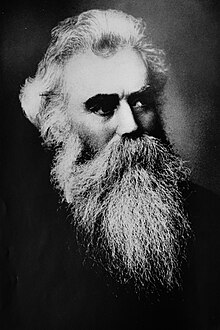Charles Edwin Wilbour
| Charles Edwin Wilbour | |
|---|---|
 |
|
| Born |
March 17, 1833 Little Compton, Rhode Island |
| Died | December 17, 1896 (aged 63) |
| Resting place | New York City |
| Education | Brown University |
| Occupation | Egyptologist |
| Spouse(s) | Charlotte Beebee |
Charles Edwin Wilbour (March 17, 1833 – December 17, 1896) was an American journalist and Egyptologist. He was one of the discoverers of the Elephantine Papyri. He produced the first English translation of Les Misérables.
He was born in Little Compton, Rhode Island, on March 17, 1833. He received a classical education and entered Brown University, where he took a prize for proficiency in Greek and was noted for his thorough acquaintance with the ancient and modern languages, but was not graduated, owing to delicate health. Having taught himself shorthand, when he had sufficiently recovered, he went to New York City in 1854 and became connected with the Tribune as a reporter. He also studied law and was admitted to the bar in 1859. The following eighteen years were devoted to literary and journalistic work. In 1872, he began the study of Egyptian antiquities and visited the principal libraries of the United States and Canada. Wilbour also owned a major paper manufacturing company, which eventually involved him in the events leading to his voluntary self-exile. He obtained many city contracts apparently dealing with Tammany Hall in the heyday of the Tweed Ring. With the fall of William M. Tweed in the early 1870s, Wilbour decided to leave the United States. In 1874, he went abroad and spent much time consulting the archaeological treasures of the British Museum and the great libraries of the continent. He then became a co-laborer with Heinrich Karl Brugsch and Gaston Camille Charles Maspero in the field of Egyptology, accompanying the latter on five winter exploring expeditions up the Nile. Wilbour spent his winters in Egypt, working at sites throughout the country from 1880 until his death in 1896. Wilbour travelled from site to site by train, postal steamer, or hitching a lift on the steamer belonging to the Department of Antiquities. By the time of his visit in 1886, however, he had decided to buy a dahabiya (houseboat), which would accommodate him, his visiting family, and his library in greater comfort.
...
Wikipedia
